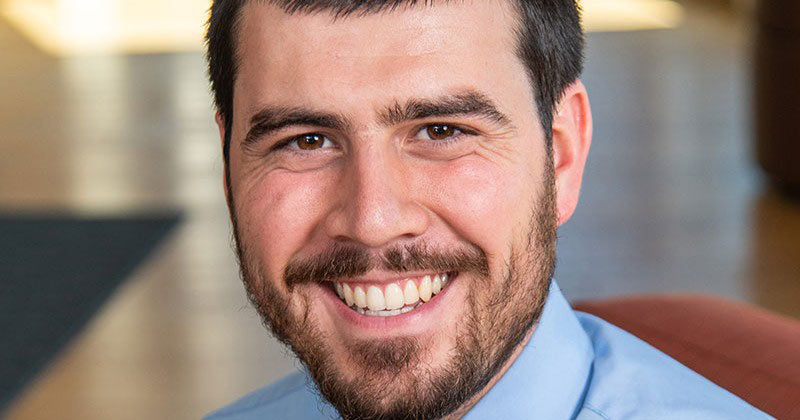Pandemic has profound impact on Dalton Ruggieri’s internships

Don’t get Dalton Ruggieri wrong. He certainly wishes COVID-19 hadn’t arrived. But, it helped shape his internship experience—and ministry—in profound ways.
Ruggieri, from Virginia, interned at Carthage College and Trinity Lutheran Church, both in Kenosha, Wis. He’s thankful for the depth and breadth of two different experiences—congregation and campus, different age groups, different supervisors (Campus Pastor Kara Baylor at Carthage is an LSTC alum).
Ruggieri’s internship project was going to be a class on sacraments in preparation for Easter Vigil, but the focus quickly became how to live during a pandemic.
“This pandemic shaped an entire generation of pastors,” he said as he reflected on the past year. “COVID defined my internship experience for me. It allowed a new space and time to grow in, and I feel like I grew so much during that time. It was more fulfilling and more about being a pastor and pastoral identity because of the crisis.
“I witnessed things that were good and weren’t so good, and how we responded. But I found that to be where I grew the most. It pushed me to grow into my pastoral identity, acting in ways that I didn’t have to in the past… Everything had to be online and on social [media] and it all got me comfortable with an ELCA pastor identity. I witnessed to the gospel and did it boldly.”
The onset of COVID demanded a theological response, which was perhaps his greatest learning experience. That response needed to be formed individually, communally and church wide, he said. “It needed to be out there.” He recorded videos and spoke to this time in history, and what the ELCA theologically believes and values.
“We needed to be Christian and Lutheran in this moment. How to be a Jesus follower and do that faithfully.”
Also, “this crisis, this pandemic, made our need for the Christian holy days clearer,” he said.
It helped, he said, that he and lots of pastors and seminarians could lean into Martin Luther’s writings on living through a pandemic. In Luther’s time, folks wanted to run away and hide, but Luther called people to show up and serve, Ruggieri said. (“Whether One May Flee from a Deadly Plague, 1527” translated by Carl J. Schindler in Luther’s Works: American Edition Volume 43).
“We are servants. We can’t just run away. We have to serve. Luther also acknowledged we shouldn’t tempt God and throw caution to the wind and do crazy things. We don’t need to put ourselves at risk by having parties and worshiping together.”
Witnessing to the gospel and serving others means not doing things like gathering together, he said. The focus is on not spreading harm or hurt to others.
“COVID gave me a strong desire and call to serve. I was able to focus on that. That included working at the food pantry and leading by example. That’s the important theological update of Luther’s pandemic for our day.”
Ruggieri also learned about the importance of communication, especially as he shared his time between two sites, staffs and supervisors.
“There were times communication broke down, and it was easy to notice how that caused stress. Two sites were a challenge—college students who communicate largely by social media such as Instagram, and congregation members who didn’t. It was a great learning experience.”
His take-away from Pastor Tom Smith at Trinity was to act with courage. “Seminaries don’t say enough about courage,” Smith told him.